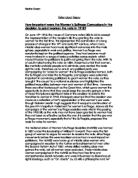Upon the outbreak of war in 1914, the two main Women’s suffrage groups, the WSPU and the NUWSS reacted in similar, though slightly different ways. The WSPU suspended all militancy for the duration, and began a drive to recruit women into war work, working as munitions workers, Land Girls, and later, in the women’s branches of the Armed Services, the WRNS, WRAAC, and the WRAF. The NUWSS, on the other hand, was bitterly divided over whether or not to support the war. While some of its members were nearly as nationalistic and xenophobic as the Pankhusrts in their support for the British war effort, there were others who were committed pacifists. There were also other, smaller Women’s suffrage groups, such as the ELFS, founded and lead by Sylvia Pankhurst, who, in defiance of her mother, completely disagreed with the war, and became a socialist anti-war agitator.
Women in the War worked extensively on the Home Front, working as Land Girls, tending the fields while the men were fighting and dying in the fields and trenches of Flanders; making the shells and bullets that they used to try and kill the Germans, and actively supporting the Armed Forces by joining Auxiliary Arms of the Army, Navy, and later, upon its formation, the RAF. Women played a vital role, especially after the Shell Shortage that hit the Western Front and caused a political scandal at home.
By 1916, Asquith, whose son had been killed in France, was close to collapse. His Liberal Government fell, to be succeeded by David Lloyd Georges Coalition Government. The new Prime Minister, had long been a sympathizer to the suffragette cause. By now the government also realized that it could no longer keep disenfranchised many of the men who were fighting and dying in France. Another problem was that under the measures Third Reform Act, one had to be registered as living in a dwelling house for twelve months to be entitled to vote, and many who could vote before the war were disfranchised, as a dug-out at No.1 Sausage Gully, Pozieres could hardly be considered a dwelling house for the purposes of voter registration. Thus, the government was already considering some kind of franchise reform. The question now facing Lloyd George and his government was whether or not to include women. The WSPU could be relied upon to resume their campaign of militancy after the war was over, and the Government did not relish the idea of having to take on the Suffragettes again. While it was entirely possible to continue to deny the women the vote and ride out the militant storm, it was not what the country needed after an expensive war. One must also remember that by this point, Britain, ‘Mother of Democracy’ was rather falling behind the rest of the democratic world when it came to the question of votes for women. Many countries, most notably the Dominions had already, or where in the process of, introducing women’s suffrage, and how could Britain lag behind these upstart countries?
The war, and the attendant upheaval also gave many prominent politicians such as Asquith the chance to climb down from a position that was now clearly untenable.
The war thus provided a catalyst for the change that was already needed, and speeded the process considerably.







